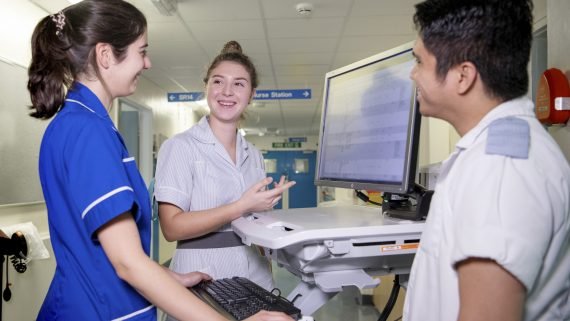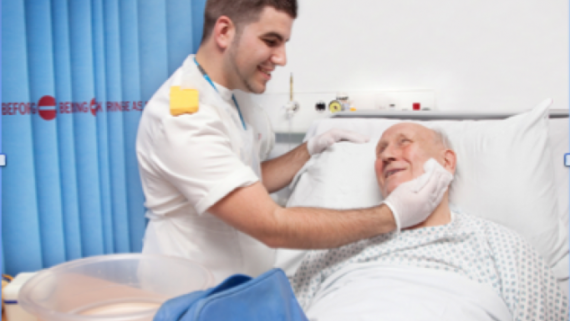We understand that before making the decision to apply for a position it is important to do your homework – to get a feel for the job and the organisation you’re thinking of joining and to decide “is this really for me?”. We spent some time talking to our healthcare support workers and asked them to tell us about their working day and what it’s like to work at Cambridge University Hospitals. These are their reflections, which we hope you will find helpful.
Arriving at work

I always arrive with enough time ahead of my start time to change out of my clothes and put my uniform on. I put my mobile on silent and put my ID badge on. I do one final check – uniform is all as it should be, hair tidy and off my collar, to make sure I’m looking professional. I think it’s important to arrive with a positive attitude so I smile and say good morning to everyone. I arrive in the staff room ready to start the shift and to listen to the handover.
Handover

We work closely in teams and at handover we find out which team we are working in and our roles for the shift. We listen to the previous shift’s update on patients and any changes in their condition so we know who our patients are and what their needs are for the day. The registered nurse I am working with will then discuss any specific tasks they would like me to carry out during my shift so we both know what we are each focusing on and what activities we will do together or which I will undertake myself."
First tasks of the day

I then start to get involved with the patients on the ward. First tasks will include helping patients get up and dressed ready for breakfast, assisting them with their personal hygiene, to use the toilet or commode and disposing of waste. I need to introduce myself to be approachable, friendly and relaxed in order to support very personal matters sensitively and without causing embarrassment. I check the electronic patient record, undertake and carefully record vital signs and input/output observations (temperature, pulse and fluids) to keep these updated and the registered nurse informed.
Patient Centred Care

Delivering patient-centred care means working together as a team and involving our patients in all discussions about their care. It’s really varied from one minute to the next… I could be helping a patient put on their anti-embolic stockings, completing fluid and food records, or supporting a patient who is upset. Some patients need regular assistance to help them get comfortable, to sit up or walk around the ward. Supporting unwell patients also means not being squeamish and dealing with things like nausea, incontinence, bad smells and occasionally blood without causing embarrassment to the patient or their visitors.
Assisting a patient to wash

One key focus is on maintaining our patients’ dignity. Taking time to assist a patient to wash is a prime example of when this is important. I always ask if they are ready for a wash and explain what I will be doing and obtain their consent beforehand. Curtains aren’t sound proof so you try to keep some privacy whilst still talking to the patient about what’s important to them. Once I have assisted the patient with their wash I make sure they are comfortable and leave the call bell and everything within reach to ensure their safety.
Using specialist equipment

We may need to use a hoist for a patient who has restricted mobility. For example, a patient may be well enough and wish to sit out of a chair but is unable to take their own weight on their legs. Using a hoist requires careful planning and a number of safety checks which I carry out before gathering sufficient colleagues to assist me. Together we agree who will lead the move, keeping the patient informed of what we are proposing to do in order for them to be able to consent and help if they can. My priority is to move the patient as smoothly as possible using the hoist, whilst maintaining their privacy and dignity.
Going off from the ward

I may be asked by the registered nurse to accompany a patient to an appointment or procedure. I will explain to the patient where we are going, and provide reassurance and care for the time we are off the ward. This is a good time to really get to know my patient. On my return I will inform the registered nurse, check what needs doing and could assist patients to have a drink or snack, clean, tidy, dispose of rubbish and clinical waste using linen/waste chutes correctly and restocking equipment. There is always something to be done and always time for a chat and a smile for my patients as I walk around the bays!
Meal times

Patients’ meal times are so important which is why we have ‘protected mealtimes’ when we come together as a team and stop all ‘non-urgent’ care. All team members help with meals, assisting patients to sit in a chair and eat well. Some patients require a lot of time and assistance to be able to eat and drink so family members or friends are encouraged to assist their relatives during meal times. Some patients may have to have special diets or have the amount of fluids they can drink restricted due to their condition, so it is essential that we update their records to show what they've had to eat and drink.
Special observations

Sometimes patients need one to one nursing due to high risk of falling, confusion or agitation for example. During this time I will not leave my patient and I will interact with them, providing care, activities and will communicate in a calm and reassuring way. It is an excellent opportunity to get to know my patient better. This will be on a rota basis so I will then give a good handover about my patient to the person taking over from me and I will update their care plan.
End of shift

Every shift is stimulating and challenging with no two shifts the same. It makes a huge difference for patients if the care we give is done with sensitivity and a smile. You are on your feet and on the go the whole time and it's important to stay focused right throughout. I have to make sure patients are comfortable, records I am responsible for are up-to-date and completed, all areas are clean and restocked before leaving. I make sure I have kept the registered nurse updated with how the patients are throughout the shift so they can handover to the next team ensuring safe continuity of care. On my way off the ward I dispose of my handover sheet in the confidential waste and check my roster so I know my next shift". Go home, rest and recharge!
Working patterns
We employ HCSWs on either a full time, part time, or Bank Basis. Full time staff work 37.5 hours per week, part-time staff work an agreed portion of full-time hours. Bank workers undertake temporary roles on either a full or part time basis. We understand temporary work is attractive allowing for greater flexibility and a better work life balance.
As a hospital, we provide a 24/7 service. Our clinical staff, including HCSWs, need to work to meet the needs of our patients, so are expected to work a variety of shift patterns including days, nights, weekends and public/bank holidays. You may be expected to work long days, short days or a combination of the two.
For new HCSWs, working patterns vary area by area and you are likely to work a mixture of shifts. Please be aware that your day shifts are likely to start at 07:00 or 07:30.
When you start work in your clinical area, you will be allocated your days and hours to work over the next four to six weeks. Your days and hours of work will change from rota period to the next so you will not normally working the same pattern in each rota period. These shifts are managed in what we call an ‘off duty rota’. The rota is usually prepared four to six weeks in advance, so you will have plenty of time to plan your home life around your shifts. It is possible to make requests for days off in advance eg to request a certain day off for a wedding or to book annual leave so you are able to have a good work life balance.










